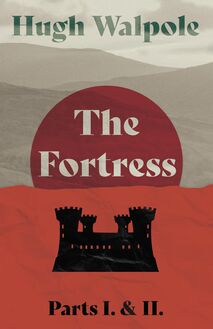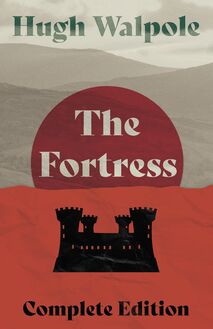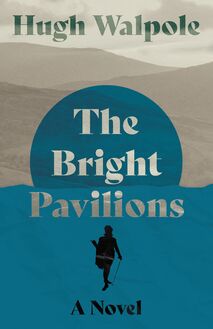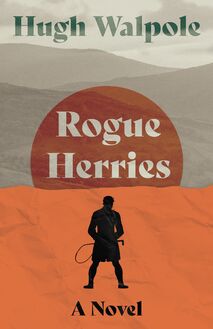-
 Univers
Univers
-
 Ebooks
Ebooks
-
 Livres audio
Livres audio
-
 Presse
Presse
-
 Podcasts
Podcasts
-
 BD
BD
-
 Documents
Documents
-
- Cours
- Révisions
- Ressources pédagogiques
- Sciences de l’éducation
- Manuels scolaires
- Langues
- Travaux de classe
- Annales de BEP
- Etudes supérieures
- Maternelle et primaire
- Fiches de lecture
- Orientation scolaire
- Méthodologie
- Corrigés de devoir
- Annales d’examens et concours
- Annales du bac
- Annales du brevet
- Rapports de stage
La lecture à portée de main
Vous pourrez modifier la taille du texte de cet ouvrage
Découvre YouScribe en t'inscrivant gratuitement
Je m'inscrisDécouvre YouScribe en t'inscrivant gratuitement
Je m'inscrisEn savoir plus
Vous pourrez modifier la taille du texte de cet ouvrage
En savoir plus

Description
Judith Paris returns to the Lake District to settle a family feud in this third volume of Hugh Walpole’s, The Herries Chronicle.
Now middle-aged, Judith must return to her countryside home to help resolve a dispute between two branches of her family. Grandeur, drama, and violence have always been at the focal point of the Herries family. First published in 1932, this third instalment of the saga tells the story of the marvellous family house, The Fortress.
Proudly republished by Read & Co. Books, The Fortress is a great addition to the bookshelves of historical fiction readers.
Sujets
Informations
| Publié par | Read Books Ltd. |
| Date de parution | 24 août 2022 |
| Nombre de lectures | 0 |
| EAN13 | 9781528797870 |
| Langue | English |
| Poids de l'ouvrage | 1 Mo |
Informations légales : prix de location à la page 0,0500€. Cette information est donnée uniquement à titre indicatif conformément à la législation en vigueur.
Extrait
THE FORTRESS
PARTS III. & IV.
By
HUGH WALPOLE
First published in 1932
Copyright © 2022 Read & Co. Classics
This edition is published by Read & Co. Classics, an imprint of Read & Co.
This book is copyright and may not be reproduced or copied in any way without the express permission of the publisher in writing.
British Library Cataloguing-in-Publication Data A catalogue record for this book is available from the British Library.
Read & Co. is part of Read Books Ltd. For more information visit www.readandcobooks.co.uk
FOR MY FRIENDS GERTRUDE AND MUIRHEAD BONE
Contents
Hugh Walpole
PART III
CUMBERLAND CHASE
UHLA ND’S JOURNAL
WAX FLOWERS AND TH E REVOLUTION
CHILDE ROLAND TO TH E DARK TOWER
EXHIBITION
THE FUNERAL
CLIMAX TO A L ONG SEQUENCE
I. JUDIT H AND WALTER
CLIMAX TO A L ONG SEQUENCE
II. SK IDDAW FOREST
CLIMAX TO A L ONG SEQUENCE
III. IN A DARK HOUSE
PART IV
MOTHER AND SON
BIRT H OF VANESSA
SAYERS V ERSUS HEENAN
SHE VISITS THE FORTRESS FOR T HE LAST TIME
ON CAT BELLS: ESCAPE FROM ECSTASY
A DAY IN THE LIFE OF A V ERY OLD LADY
AT VICTORINE’S
BATTLE W ITH PANGLOSS
THE HUNDRE DTH BIRTHDAY
Hugh Walpole
Hugh Seymour Walpole was born in Auckland, New Zealand in 1884. He was educated at a series of boarding schools in England, followed by Emmanuel College, Cambridge. Walpole’s father hoped he would follow him into the clergy, but after three years as a missionary, in 1909, Walpole resolved to become a man of letters. His first commercial success came in 1911 with the novel Mr Perrin and Mr. Traill , after which Walpole made the acquaintance of writers such as Henry James and Joseph Conrad, and declared his ambition to become the greatest writer of his era. For the rest of his life, Walpole wrote prolifically. During the twenties he produced more than a novel a year, with The Cathedral (1922) and Wintersmoon (1928) proving to be great successes. In 1930, he began his most popular series of novels with the historical romance Rogue Herries , following it with Judith Paris (1931), The Fortress (1932) and Vanessa (1933). Eventually, he amassed an oeuvre of 36 novels, five volumes of short stories, two plays and three volumes of memoirs. He died in 1941, aged 57. Despite the fact that Walpole sold enormously well on both sides of the Atlantic, and was praised by many of his contemporaries, he is somewhat forgotten now, in part because he was overshadowed by P. G. Wodehouse and others.
Th y gentlest dreams, thy frailest,
Even those that were
Born and lost in a heart-beat,
Shall meet thee there.
They are become immortal
In shining air.
The unattainable beauty,
The though t of which was pain,
That flickered in eyes and on lips
And vanished again;
That fugitive beauty
Thou shalt attain.
Those lights innumerable
That led thee on and on,
The masque of time ended,
Shall glow into one.
They shall be with thee for ever,
Thy travel done.
A. E.
PART III
CUMBERLAND CHASE
UHLAND’S JOURNAL
Ireby. Janu ary 5, 1843.
Finished to-night that stuff-and-nonsense book Carlyle’s Heroes . Wonder that I had the patience to read it on to the end, but I fancy that I was always going furth er to see wh ether all his tall words and Germa n sent ences would lead to anything. They do not any more than does this damnably silly Journal of mine. There is just this difference. Carlyle is a hypocrite and I am not. He knows he is no hero but says he is one—I know that I can be a hero as suitably as any of his Fredericks and Cromwells, but prefer not to be one. And why do I prefer? Because the world is so crammed with fools and conceited coxcombs that it is a finer thing to sit by and watch—to watch, if you like, the decline and fall of the house of Herries and myself with it. Bang—Bang—Bang—Whiskers—Whiskers—Whiskers. This is nothing but the sound a blind man makes seeing himself to bed with the light of a thick stick and the smell of the candle-end. And it is also, if you like, the noise that my beloved father and Sam Osmaston are making just under this floor of my room, both as drunk as cockchafers in lamplight, on their knees most likely, searching for a goos e’s feather.
But this Journal is supposed to say what I do. Well, what do I do? Get up, you lamentable cripple, and look at yourself in the glass, examine once again your ugly wry face, your ribs, like an old man’s counting-board, and your white bit of twisted bone politely called a leg. Good, good! That’s the thing, my boy! That’s the way to bring your conceit down and sit on the floor to talk about Heroes. But the soul’s the thing, is it not? Does not old Carlyle say so? The soul! The soul! Where may you be, soul? Stuck in that leg of mine? Hiding like a rabbit behind a rib or two? Well, come out for once! Let’s have a look at you! Where are you, green, crimson or mulberry; and your shape? Are you tortoise-like with a shell like a snuff-box, or thin and spidery, catching flies for your food, or just a pincushion with pink lace and a bl ue silk bow?
What a week I ’ve had too!
They’ve all been here. The Newmarks with all their brood, Phyllis a female Alderman, Newmark the prize prig of the market, Horace as long in the leg as a pair of stilts and as wooden, dear little Emily and dear little Barnabas. All with the latest news of my good grandfather’s new offspring. ‘Oh, what a sweet infant! the dearest little boy!’ until I thought my father would throttle the lot of them. Amery Herries too with eyes like gooseberries, the merriest drunken bachelor, and old Rodney from Polchester, sixty if he’s a day, touring the Lakes and Scotland with one eye on his clerical dignity and the other on the destiny of every halfpenny! Lord, how I hate the lot of them and how they hate me! Didn’t I make little Emily cry by blowing out the candle, and isn ’t old Rodney afraid of my humours? A family sinking to rot, my masters, cursed because, between too much money-bag on the one side and too much indecisive dreaming on the other, the way to Salvation is missed every time. Not that there is any Salvation, even though you search for it. Nothing but madness or death from over-eating whichever way you go.
But now when the house is silent and every stone in this building can be heard scraping its reproaches, I wonder at my indignation. Indignant? No, I have not blood enough for so bold a word. I sit here, sneezing, rubbing my knees the one against the other, healing Rob’s ear in the basket, raising my perpetual theme of hatred of my dear John brother-in-law and do nothing, positively nothing. Neither lust urges me nor greed nor envy nor desire for knowledge: only if I had John’s neck here I would twist it until his eyes were in his back, and even that is a fancy—nurtured lust, something bred of years of coddling. It had a reason once and now I’ve fed my brain with so many centuries of imagination that to see him tortured in my fancy is as good as the actual deed.
And yet it could have been otherwise. Only this stupid mutton-faced Journal shall know how otherwise it might have been! Another father, flat-faced Adam for a brother and a pair of legs like anyone’s, and I had the power, the wish, the ambition. I could have written a book or two, I fancy, better than Bulwer at any rate, or played in a laboratory and made a discover y, or talked as wittily as any Disraeli or Palmerston of them all. I have more brains in my toe-nail (those on the withered foot have an especial brilliancy) than all my Herries cousins lumped together. But from the very first I was outcast. That at least is no imagination. I make no claim for it and I ask for no pity, but to be different from birth, to have the street children mock at you and the dogs bark, and visitors to the house look the other way—it is a kind of allowance for hatred. They say Carlyle has dyspepsia and yet he thinks himself a Hero. Well, am I not a Hero that I sit here and think, and think, and wish myself a villain? And my father still loves me. He thinks me a miracle of brilliance and perversity. All that is left to him, poor man, for his brain is fuddled with drink, the ladies won’t call, his fine house is a stony desert, and they flourish at Uldale like th e righteous!
Ah! there’s the rub! Cousin Judith as lively as a flea, Cousin Dorothy and her children fat as good cattle, John and Elizabeth like sucking-doves. There! He is singing. I can hear him under the floor. And Sam Osmaston with him—a fine out-of-tune c horus . . .
Ireby. Novemb er 13, 1843.
Rob’s ear has this canker again. It’s his perversity, I well believe, for he knows truly that once his ear is well, out he’ll go, to be stoned by the Keswick boys again, I suppose. And the odd thing is, I shan’t care. He’s been with me almost a year now. I enjoy his face like the parson’s, with its side-whiskers and a slobbery white patch like spilt milk on his nose. He’s fonder of me than any dog’s ever been, but I hate that sycophancy. I’m near shooting him at times or hanging him from the beam with a rope—yes, even while I wash and clean his ear with the tenderness of a woman.
And now what do you think, O my Journal? What has our dear father done but buy a piece of the moor just above Uldale and build a small cottage on it and into that shove Peach and his dirty brood. There is just one patch, it seems, that great-grandfather David neglected to buy, a measly brown bit that even the sheep neglect. He has done it to vex Aunt Judith of course, and vex her it must to have the filthy little Peaches at her garden gate, and Peach at war with her drunke n Rackstraw.
Since she scratched dear father’s cheeks last Christmas-time he’s been all bent on vexing
-
 Univers
Univers
-
 Ebooks
Ebooks
-
 Livres audio
Livres audio
-
 Presse
Presse
-
 Podcasts
Podcasts
-
 BD
BD
-
 Documents
Documents
-
Jeunesse
-
Littérature
-
Ressources professionnelles
-
Santé et bien-être
-
Savoirs
-
Education
-
Loisirs et hobbies
-
Art, musique et cinéma
-
Actualité et débat de société
-
Jeunesse
-
Littérature
-
Ressources professionnelles
-
Santé et bien-être
-
Savoirs
-
Education
-
Loisirs et hobbies
-
Art, musique et cinéma
-
Actualité et débat de société
-
Actualités
-
Lifestyle
-
Presse jeunesse
-
Presse professionnelle
-
Pratique
-
Presse sportive
-
Presse internationale
-
Culture & Médias
-
Action et Aventures
-
Science-fiction et Fantasy
-
Société
-
Jeunesse
-
Littérature
-
Ressources professionnelles
-
Santé et bien-être
-
Savoirs
-
Education
-
Loisirs et hobbies
-
Art, musique et cinéma
-
Actualité et débat de société
- Cours
- Révisions
- Ressources pédagogiques
- Sciences de l’éducation
- Manuels scolaires
- Langues
- Travaux de classe
- Annales de BEP
- Etudes supérieures
- Maternelle et primaire
- Fiches de lecture
- Orientation scolaire
- Méthodologie
- Corrigés de devoir
- Annales d’examens et concours
- Annales du bac
- Annales du brevet
- Rapports de stage














